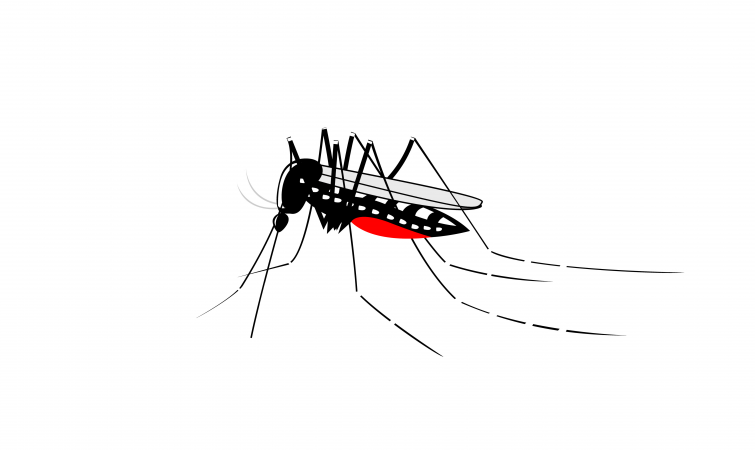
December 20, 2024
Bulletin interne de l'Institut Pasteur


Exploiting mosquito immunity to tackle arboviruses, an innovative project selected for funding under the CATRIEM call for proposals
Arboviruses, a major risk for epidemic outbreaks
Mosquito-borne arboviruses such as dengue, chikungunya, Zika and West Nile virus infect more than 400 million people each year, and because of climate change they are now also found in European regions.
Given the high risk of an epidemic over the next few years, and since there are no effective vaccines or treatments for most arboviruses, Carla Saleh from the Viruses and RNA Interference Unit has come up with a novel vector control method for arboviruses that tackles the main arbovirus vectors, Aedes aegypti and Ae. albopictus mosquitoes.
Initial internal funding to support an original methodology
In 2020, Carla Saleh presented her innovative methodology, based on the use of extrachromosomal circular viral DNA (eccvDNA) to strengthen the antiviral response of mosquitoes, to the Technology Transfer and Industrial Partnership Department (DARRI). Her project was selected in the DARRI/Carnot Emergence call for proposals (see below) as a promising strategy to limit arboviruses.
The method involves "vaccinating" mosquitoes against arboviruses by using synthetic circular viral DNA carrying viral sequences. It has several advantages: it does not mosquito induce sterilization or fitness costs and is theoretically applicable to all types of RNA virus, individually or combined.
CATRIEM (France 2030) funding to validate proof of concept
As the preliminary data obtained via the internal funding was particularly promising, the Grant Office, the DARRI and the scientific team worked together to identify a suitable call for proposals to fund the next stages of the project, and it was duly selected for funding.
The funding body is the Acceleration and Transfer Consortium for Responses to Emerging Infections and Threats (CATRIEM), which was successful in the France 2030 Maturation-Prematuration call for proposals. The aim of the consortium, coordinated by SATT Pulsalys and Inserm Transfert, is to select and co-fund innovative projects aimed at developing therapeutic agents, biomarkers, vaccines, vector control agents, antibodies, etc. to tackle a list of priority pathogens.
The funding of €120,000 over 18 months will enable the recruitment of a postdoctoral fellow to coordinate the proof of concept testing and optimize the vector control method. This work will be essential to advance the project along the innovation pipeline and attract the interest of industry with a view to future development.
2024 results of the internal "DARRI/Carnot" call to support innovative projects
Each year, an open call funded by the DARRI and the Pasteur Microbes and Health Carnot Institute (the Institut Pasteur has been part of the Carnot network since the accreditation was first introduced) provides support for innovation development programs, offering a maximum grant of €150,000 over 12-24 months for each selected program. The projects submitted are analyzed by external experts (scientists and industry players) and members of the Consultative Innovation Committee.
Projects at an early stage may apply for the EMERGENCE call. The aim at the end of these projects is to create intellectual property.
Projects at an advanced stage may apply for the MATURATION call. The technology readiness level (TRL) expected for this type of project is higher than for EMERGENCE projects. The aim is to strengthen an existing proof of concept.
The 2024 winners of the DARRI/Pasteur Microbes and Health Carnot Institute call for proposals are:
- Philippe Bousso (Dynamics of Immune Responses Unit) for the project "CAR-GO and KAMI-CAR: Delivering cytokines and inflammatory mediators at the tumor site with temporal control (KAMI-CAR-GO)"
- Muhamed-Kheir Taha (Invasive Bacterial Infections Unit) for the project "Multi-component vaccine candidates against Nontypeable Haemophilus influenzae"
- Jack-Christophe Cossec (Nuclear Organization and Oncogenesis Unit) for the project "Revealing Transcriptomic Signatures of Rare Genetic Diseases in Cell Fate Transitions through a Perturbation Screen in Embryo-Like Structures"
- Ludovic Sauguet (DNA replication group) for the project "Engineering a miniature polymerase for DNA and RNA printing"
- Chetan Chitnis (Malaria Parasite Biology and Vaccines Unit) for the project "Development of a multi-stage mRNA vaccine for Plasmodium vivax malaria (VIVAC)"
- Matthijn Vos (NanoImaging Core Facility) for the project "Multi Cell Wafer"
- Najma Rachidi (Molecular Parasitology and Signaling Unit) for the project "Developing Nanobodies Against Leishmania CK1.2, as a novel therapeutic strategy against leishmaniasis"
- Florian Muller (Photonic BioImaging Core Facility) for the project "Picasso – Photo-switchable immobilization of cells for AI-assisted screening and sorting"
Summary in English of the CATRIEM prematuration project "Harnessing Mosquito Immunity to Engineer Novel Suppression Strategies Against Arboviruses – MESSA" by Carla Saleh's team:
Mosquito-transmitted arboviruses, such as dengue, chikungunya, Zika, and West Nile viruses infect over 400 million people a year. Due to climate change they have currently spread into European regions. Despite their prevalence, there are no effective vaccines or therapeutics against most arboviruses. Due to the high financial and time costs associated with vaccine development, new alternative solutions to limit the spread of arboviruses are urgently needed. Vector control methods targeting Aedes aegypti and Ae. albopictus mosquitoes, the principal vectors of these viruses, remain the most promising strategy to limit these diseases.
In the CATRIEM prematuration program, we will carry out key proof-of-concept tests and optimizations for our novel arbovirus vector control method based on the use of extrachromosomal circular viral DNA (eccvDNA) to suppress the transmission of arboviral diseases including dengue, chikungunya, Zika, and West Nile viruses. Synthetic eccvDNA carrying viral sequences can enhance the mosquitoes own antiviral response, thus hindering arbovirus transmission to humans, effectively « vaccinating » mosquitoes against arboviruses. This novel approach will enhance the mosquitoes own antiviral response, without sterilization or -yet theoretical- fitness costs, against all types of RNA viruses, individually or combined.